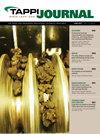塔尔油分离的关键参数I:脂肪酸与松香酸比例的重要性
IF 0.6
4区 农林科学
Q4 MATERIALS SCIENCE, PAPER & WOOD
引用次数: 2
摘要
Tall油是木材化学制浆中的一种有价值的副产品,其馏分作为化学前体、洗涤剂和燃料有着广泛的应用。塔尔油的高回收率对化学纸浆厂的经济和环境状况具有重要意义。本研究的目的是研究从黑液中分离全油的关键参数。为了以可控的方式对此进行研究,我们开发了一个模型测试系统,该系统使用“合成”黑液(活性烹饪化学物质OH-和HS-离子),一个完整的除皂过程,并基于溶剂提取和比色分析测定回收的妥尔油,具有良好的再现性。我们使用所开发的系统来研究脂肪酸与松香酸的比例对妥尔油分离的影响。当存在大量松香酸时,妥尔油的回收率较低,而60%以上的高脂肪酸含量显著促进了妥尔油分离。因此,在撇皂步骤之前控制黑液中脂肪酸的含量会显著影响妥尔油的溶解度,从而影响其分离。这些发现开辟了提高塔尔油产量的化学方法。本文章由计算机程序翻译,如有差异,请以英文原文为准。
Critical parameters for tall oil separation I: The importance of the ratio of fatty acids to rosin acids
Tall oil is a valuable byproduct in chemical pulping of wood, and its fractions have a large spectrum of applications as chemical precursors, detergents, and fuel. High recovery of tall oil is important for the economic and environmental profile of chemical pulp mills. The purpose of this study was to investigate critical parameters of
tall oil separation from black liquor. To investigate this in a controlled way, we developed a model test system using a “synthetic” black liquor (active cooking chemicals OH- and HS- ions), a complete process for soap skimming, and determination of recovered tall oil based on solvent extraction and colorimetric analysis, with good reproducibility. We used the developed system to study the effect of the ratio of fatty acids to rosin acids on tall oil separation. When high amounts of rosin acids were present, tall oil recovery was low, while high content of fatty acids above 60% significantly promoted tall oil separation. Therefore, manipulating the content of fatty acids in black liquor before the soap skimming step can significantly affect the tall oil solubility, and hence its separation. The findings open up chemical ways to improve the tall oil yield.
求助全文
通过发布文献求助,成功后即可免费获取论文全文。
去求助
来源期刊

Tappi Journal
工程技术-材料科学:纸与木材
CiteScore
1.30
自引率
16.70%
发文量
59
审稿时长
6-12 weeks
期刊介绍:
An internationally recognized technical publication for over 60 years, TAPPI Journal (TJ) publishes the latest and most relevant research on the forest products and related industries. A stringent peer-review process and distinguished editorial board of academic and industry experts set TAPPI Journal apart as a reliable source for impactful basic and applied research and technical reviews.
Available at no charge to TAPPI members, each issue of TAPPI Journal features research in pulp, paper, packaging, tissue, nonwovens, converting, bioenergy, nanotechnology or other innovative cellulosic-based products and technologies. Publishing in TAPPI Journal delivers your research to a global audience of colleagues, peers and employers.
 求助内容:
求助内容: 应助结果提醒方式:
应助结果提醒方式:


